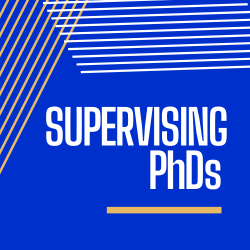‘Community Acuity’ blog posts are from supervisors, to supervisors. They share the thoughts, experiences and reflection of the highs and the challenges of supervising doctoral students. This is a guest post by Dr Alejandro Pérez-de-Luque, at the Andalusian Institute for Research and Training in Agriculture, Fisheries, Food and Ecological Production (IFAPA), in Spain.

My general approach to supervision is centred on empathy, in sharp contrast to some of the tyrannical supervisor behaviour I have witnessed over the many years: I try to put myself in the other person’s situation. I remember back to when I was a PhD student, and the problems my colleagues and I encountered during that stage. In addition, I try to identify what skills and knowledge I had to develop during those years, that have been useful and valuable later in my career as a scientist. With all those things in mind, I try to help PhD students to find their own way during thesis development and let them take the reins of their own work.
I prefer to give guidance and orientation, which is better for developing independence than just a list of tasks. I prefer that they learn to be confident and self-sufficient but not afraid to ask for help, guidance or advice. I want them to learn to say “I don’t know” – I think this is important in science. For example, we sit down together to think about and discuss the objectives of their research, and I like to ask them how they will approach the problem we are investigating. If they have no suggestions, I share some ideas (some more feasible, sometimes even crazy ones).
Then I ask their thoughts. Will it be affordable in the lab? What amount of work does it involve? Is it a realistic approach? What are the flaws and problems we could face? And of course, when I don’t know something, I say so, and ask if they have some knowledge about it. If the reply is no, we try to find answers together. Sometimes we do not have specific information about an experiment, so I ask if they could review and find something in the literature to develop a protocol, or I can give them a reference as a starting point from which they can pull on the thread. In that way, we start modelling the work and the necessary tasks taking a realistic approach, which is compatible with the life beyond the laboratory. Because I encourage PhD students to take holidays and enjoy weekends too; planning work while leaving space for downtime is part of the learning process too.
In addition, I want them to distinguish between ‘being self-sufficient’ and ‘working alone’: we are part of a team with more people in it. For that reason, when it is possible and required, I encourage them to ask for help from other members of the team, the researchers, postdocs, technicians and other students. And the opposite too: if someone else asks them for help, I encourage them to grant it. It is a way to show that science is not a competition (despite the fact there is competition), and that everyone can learn from and teach everyone involved, it doesn’t matter what stage of their career they are at.
Finally, I do not have programmed meetings with the students (unless strictly necessary), I rather prefer to have my door always open for them: if they need my assistance or to ask for something, they just come in. Nevertheless, if someone takes a long time to come around and see me, I usually look for them and exchange a few words to be sure everything is going right. And if something is wrong, then let’s face the problem and find solutions together.

